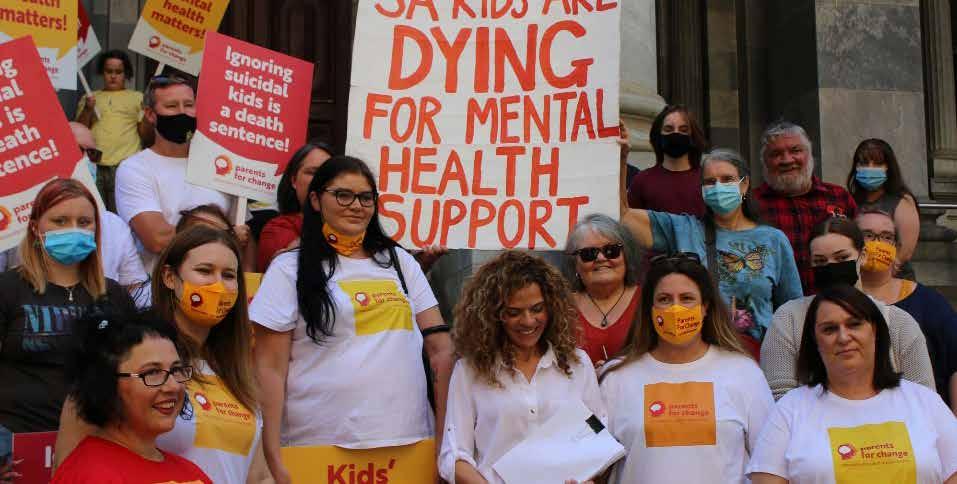
4 minute read
The Power of Protest
The Power of Protesting
Now more than ever we need global change. The past few years have seen major political conflicts and failures, the most obvious now being Putin’s invasion of Ukraine. Additionally, the COVID pandemic has seen political leaders including Scott Morrison, Donald Trump and Jair Bolsonaro neglect to protect their people by opening and/or closing borders at inopportune times, or simply failing to act at all, thus increasing the number of infections.
Furthermore, Australia has seen a major cry for help from the health sector; nurses, aged care workers, and other health workers have been made to work overtime, go to work whilst infectious, and receive a less than satisfactory salary. The near passing of the Religious Discrimination Bill also came as a shock to the nation and revealed where the Morrison government’s loyalty truly lies – not with Australia’s most vulnerable and in need, but with their own self-interest. Such condemnable actions have inspired grief and anger in Australian people as well as the globe. This collective anger must find not just an outlet but a receptive audience.
Here is where ‘the protest’ comes in.
A protest is ‘a strong complaint expressing disagreement, disapproval, or opposition’ (Cambridge Dictionary). Protests represent a collective of people whose grievances about a certain aspect or aspects of their society are expressed online or in person. Usually, they’re expressing their grievances towards a government body, who possess the societal power to instigate change. These powers usually include lawmakers, parties, leaders of an institution, elite members of society or, more broadly, those with money, power and influence.
A common attitude towards protests and rallies is that they rarely amount to anything. They’re just a channel through which delinquents can express their rage and quench their thirst for violence and radicalism.
This couldn’t be further from the truth. Protests are for the people. Since antiquity, they’ve always been a means for democracy. People from all corners of the world protest, because at one point or another, they’ve felt wronged by the very people who are meant to protect them.
Now, you may say, well yes, protests can be for everyone, but they still don’t do anything. Another fallacy.
There have been many instances in which protesting has instigated some form of change. Amnesty International’s 2021 article on ‘20 Years of Write for Rights’ details 11 instances in which protests have amounted to someone’s freedom, governmental change or, at the very least, global awareness.
The Civil Rights Movement, LGBTQIA+ movements and feminist movements, all of which have involved mass protests, have changed and continue to change society for the better.
And let’s not forget one of the most famous protests in history, the Peasant’s Revolt of 1381.
The Third Poll Tax of 1381 sparked collective fury at England’s widespread class injustice. A massive uprising, led by Wat Tyler, involved the destruction of buildings with links to the royal court, the murder of opposing tax officials, lawyers and priests, and the burning of several tax documents and registers. Whilst it is largely seen as an unsuccessful rebellion due to a lack of immediate change, it sowed the seeds for the Poll Tax’s eventual removal and serfs’ ability to buy their freedom.
Such a delayed effect is normal proceeding mass protests. ‘In the short term the likely result is often repression and condemnation,’ criminologist Matt Clement claims. ‘[H]owever, governments have learned to respond to these actions across the centuries.’
And it is now, in the 21st century, that people under democratic rule can protest and see more immediate results. Furthermore, ‘the digital age’ has made it much easier for just about anyone to organise a rally or protest
Social media in particular has caused a major change in how we organise and run protests. When researching for this article, I was notified of many local protests via Facebook. Furthermore, I was also given the option of attending online protests, a handy alternative in the event of a lockdown or selfisolation. Though, with the advent of social media comes a common tendency to engage in passive activism. An issue which all of us, myself included, are guilty are doing.
So, I encourage you not to partake in ‘slacktivism’, a term coined in 2009 to ‘describe feel-good online activism that has zero political or social impact’ (Morozov). Refrain from simply liking or sharing a post and calling it a day. Research more about the subject of the protest (knowledge is power, after all). Listen to the stories of those who are most affected by the issue. Donate to a fundraiser or sign a petition. And perhaps, if you dare, attend a protest.
‘[T]he sound of the crowd reveals the crimes of the powerful and of state-sanctioned violence […] This sound is not one to be considered as outside of the law but as necessary to the functioning ozf society, as a counter-balance to power and authority which is held in the hands of the few.’ (Evans)
Words by Georgia Nolan









